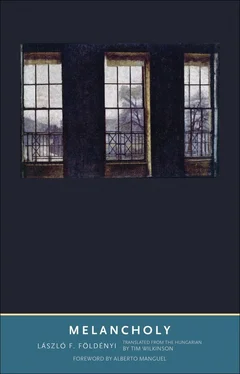László Földényi - Melancholy
Здесь есть возможность читать онлайн «László Földényi - Melancholy» весь текст электронной книги совершенно бесплатно (целиком полную версию без сокращений). В некоторых случаях можно слушать аудио, скачать через торрент в формате fb2 и присутствует краткое содержание. Год выпуска: 2016, Издательство: Yale University Press, Жанр: Современная проза, на английском языке. Описание произведения, (предисловие) а так же отзывы посетителей доступны на портале библиотеки ЛибКат.
- Название:Melancholy
- Автор:
- Издательство:Yale University Press
- Жанр:
- Год:2016
- ISBN:нет данных
- Рейтинг книги:4 / 5. Голосов: 1
-
Избранное:Добавить в избранное
- Отзывы:
-
Ваша оценка:
- 80
- 1
- 2
- 3
- 4
- 5
Melancholy: краткое содержание, описание и аннотация
Предлагаем к чтению аннотацию, описание, краткое содержание или предисловие (зависит от того, что написал сам автор книги «Melancholy»). Если вы не нашли необходимую информацию о книге — напишите в комментариях, мы постараемся отыскать её.
, with its profusion of literary, ecclesiastical, artistic, and historical insights, gives proof to such praise. His book, part history of the term
and part analysis of the melancholic disposition, explores many centuries to explore melancholy’s ambiguities. Along the way Földényi discovers the unrecognized role melancholy may play as a source of energy and creativity in a well-examined life.
Földényi begins with a tour of the history of the word
from ancient Greece to the medieval era, the Renaissance, and modern times. He finds the meaning of melancholy has always been ambiguous, even paradoxical. In our own times it may be regarded either as a psychic illness or a mood familiar to everyone. The author analyzes the complexities of melancholy and concludes that its dual nature reflects the inherent tension of birth and mortality. To understand the melancholic disposition is to find entry to some of the deepest questions one’s life.
This distinguished translation brings Földényi’s work directly to English-language readers for the first time.
Melancholy — читать онлайн бесплатно полную книгу (весь текст) целиком
Ниже представлен текст книги, разбитый по страницам. Система сохранения места последней прочитанной страницы, позволяет с удобством читать онлайн бесплатно книгу «Melancholy», без необходимости каждый раз заново искать на чём Вы остановились. Поставьте закладку, и сможете в любой момент перейти на страницу, на которой закончили чтение.
Интервал:
Закладка:
The melancholic of the modern age is, above all else, sad, the heroic endeavor and universal desperation of the Renaissance having been supplanted by mere despondency. He has been denied the possibility of creating a new world, but also prevented from dodging a world that is alien to him. Turning away from the world takes place inside the soul — the world torments and crushes as it pleases anyone who, by creating an inner world, tries in vain to escape from external pain. The sadness of the modern melancholic springs from helplessness; whatever he does, he feels that all efforts are futile — no one is capable of cracking the world’s armor. Sadness, however paradoxical it may sound, is at one and the same time a visor and armor — a visor because the melancholic, by turning into himself, refuses to take cognizance of the fact that the despondency deriving from helplessness was actually imposed on him; a weapon because it gives an opportunity to create a new, inner world in opposition to the outside one. The melancholic would give himself over to despondency with masochistic pleasure: the soul always has a realm into which no one else is permitted entry. That dominion extends “inwardly”; the stronger the external pressure, the more the inner boundaries expand. The world is unacquainted with this dual nature of sorrow: it fails to notice both that a person can take cover in sorrowfulness, and that sadness is capable of denying everything. All that is seen is that sorrow always renders a melancholic weak, and his weakness is explained by his own superior strength: “Whatever excuse we may find for our sorrows, often it is only self-interest and vanity that cause them,” La Rochefoucauld opines ( Collected Maxims and Other Reflections , V: 232), offering a novel interpretation of sadness: instead of connecting it with an all-embracing despair, he tries to ensure a place for it in the preordained framework of an unchangeable world. If sorrow depends only on interest or vanity, then this rules out making the world itself questionable: a person’s sadness is caused by this or that not being to his liking in this world, but that sadness would not extend to the whole world itself. The world always tries to console the sad and convince them that sooner or later everything will work out. And indeed, in the modern age, the biggest offence against decorum is to thrust someone who is despairing and sad into even greater depths of despair by telling him that he does have a reason to be sad and, what is more, not just because some trouble has befallen him, but because the world is deliberately constructed to be a fount of woes. One is just as much expected to console a sad man as to deceive a terminally ill one about his true condition — consolation, however, conceals deception: it does not abolish despondency but defers it, makes it invisible. And sadness that has been made invisible proliferates like cancer: the less the consoled person takes note of it, the more violently will it well up at an unexpected moment.
La Rochefoucauld tried to make despondency presentable in good society. The melancholic is not fleeing the world but trying to find himself a quiet nook within it; he does not make immoderate demands; he is not enraged and raving, as in antiquity; he is not mentally ill, as in the Middle Ages; he is not desperately calling anything to account, as in the Renaissance; but he is, above all, depressed: quiet, withdrawn into himself, feeble, and inert. According to Pascal, the aim of the French court at the time was to stifle the sadness and melancholia that was breaking out on all sides:
Put it to the test; leave a king entirely alone quite at leisure, with nothing to satisfy his senses, no care to occupy the mind, with complete leisure to think about himself, and you will see that a king without diversion is a very wretched man. Therefore such a thing is carefully avoided, and the persons of kings are invariably attended by a great number of people concerned to see that diversion comes after affairs of state, watching over their leisure hours to provide pleasures and sport so that there should never be an empty moment. In other words they are surrounded by people who are incredibly careful to see that the king should never be alone and able to think about himself, because they know that, king though he is, he will be miserable if he does think about it.
( Pensées , no. 142)
Sorrow does not spare even a king (“Mournful melancholia usually dwells in palaces,” writes François-André Philidor, a French composer of the Baroque era), but that sadness can be explained also by the world turning gray: if everything is alike, then there is no place to withdraw from boredom and despondency. Court etiquette, with its Baroque pomp, was unable to lift the insidious monotony, even as the dazzlement of each stroke of inspiration outdid the previous one; indeed, it seems that it was precisely grayness, an ever-intensifying sense of helplessness, that necessitated pomp and splendor. Although the seventeenth and eighteenth centuries presented great opportunities, compared with the heroes of the Renaissance and the great adventurers of the sixteenth century it is impossible to fail to notice the graying: the organized, constitutional, or absolutist form of government narrowed individual opportunities to a great extent, in both a metaphysical and a practical sense. During the seventeenth century, typically, interest in so-called character sketches grew throughout Europe—
species
and
types
came to the fore at the time when the place of the great man was taken by the
average
person. That was
a characteristically modern phenomenon.
15
Until the seventeenth century, only those in power possessed “individuality”; however, as power started to become depersonalized, the common man came to power. “A middle-class manner is sometimes shed in the army, but never at court,” La Rochefoucauld writes (
Collected Maxims
, V: 393).
Courts created sham occupations — the refined and proliferating rules of etiquette, however, although making those affected forget that they had lost their true power and individuality, could not eliminate tedium . Next to sadness, that is the other distinguishing mark of melancholia in the modern age. Boredom is elicited by order, or to be more accurate, by foreordained order: if people are deprived of the possibility to act, boredom takes over everything. Tedium becomes a way of life forced on all. In the course of the seventeenth century, the great representatives of boredom emerged from the ranks of the nobility, from a nobility whose way of life began increasingly to lose its raison d’être. La Rochefoucauld mentions his own melancholia as an almost compulsory fashion item for the nobility: “To speak first of my temperament, I am melancholy — to such a degree that, in the last three or four years, I have hardly been seen to laugh three or four times,” he says, before continuing, “Most of the time I am either daydreaming without uttering a word or else giving very little attention to what I am saying” ( Collected Maxims , 277). Melancholia was not just a matter of temperament and nature: the reference to a specified time frame (three to four years) signals that it was a consequence of something — presumably of boredom and inertia. Whiling away his time at a salon, on one occasion the duc de Saint-Simon noticed that a bored La Rochefoucauld was breaking the rules of etiquette by playing chess with his valet: “Monsieur de Chevreuse and I could not even say a word. Spotting this, La Rochefoucauld was himself embarrassed. . tried to explain the situation, saying that the valet played very well, and one could not play chess with everyone. De Chevreuse did not contradict him, and neither did I; we behaved courteously and sat down but then soon got to our feet so as not to disturb the game, and we slipped away as speedily as we could” (quoted in Wolf Lepenies, Melancholie und Gesellschaft , 172). La Rochefoucauld himself had the following to say about the relationship between duty and boredom: “If we carefully consider the various results of heartache ( l’ennui ), we shall find that it causes more failures of duty than self-interest does” ( Collected Maxims , V: 172). Duty is the be-all and end-all of life, and it is not good manners to challenge life; it bespeaks bad form to deliberately flout it. Boredom, hand in hand with sadness and inertia, puts up with everything; bored people allow the world to direct their footsteps. What really bores people is being condemned to inaction. Their personalities urge them to make the best of their rights and realize everything inherent in their individuality, but they have to endure being clapped in irons: order, or more precisely, the world that is held together like a net by proliferating institutions and precepts, allows one only faith and illusion . Tedium is not simply the enduring of something but also a negative realization of the personality; for the person who is bored, it is not purely a matter of time passing but, as time passes, of recognizing the innumerable opportunities that are not being put to use. The fulfillment of time betokens one’s own emptying. The more extremely one is bored, the more stultifying one’s own ego becomes to oneself. One is horrified to observe oneself. Pierre Drieu La Rochelle appositely pointed out in the middle of the last century that “terror is the grimacing face of boredom” (Drieu La Rochelle, Geheimer Bericht und andere biographische Aufzeichnungen , 205): terror and tedium share a common root. Bored people see everything as empty, nothing, condemned to annihilation, and while they involuntarily also see that boredom is hastening the path toward death, they realize with horror that it has already taken up abode in them: from birth on, nothingness, space, death, has been building a nest in them. Those who are truly bored experience their own personality as a negative imprint, an intaglio — and the greater the tedium, the more plastic and tangible the negative relief that their personality forms. “Extreme heartache rids us of heartache,” La Rochefoucauld writes ( Collected Maxims , PV158: 3), no doubt thinking of the negative pleasure that, as a result of tedium, offers a new and independent personality to those who are bored because they suffer from an ordered, regimented life, even if that new personality accentuates a feeling of loss. There are two kinds of tedium: the sort that is on this side of orderliness and accepts the world for what it is — that kind of tedium does not call itself by its rightful name and indeed strenuously objects when it is accused of boredom; 16the other kind of boredom is beyond order: it is desperate boredom, which, by accepting itself, turns the world upside down and claims that its orderliness is unnatural and dreadful. Self-imposed boredom that is taken upon oneself is a silent protest , an exchange of the existing order and world for a negative order and world (Kierkegaard calls boredom the daemonic side of pantheism). Consciously accepted boredom lifts its subjects out of the world, making them capable of regarding nothingness and negativity , which the world forces them to suffer, as the supreme characteristics not just of their own being but of the world as well. The bored person senses that his burgeoning opportunities are being squandered, his personality is realized as negativity — though he can sense that only because the innermost essence of the world, which reproves him, is itself negative; it is an inverse world that fritters his opportunities away, and in it the passage of time brings inevitable ruination. Boredom would not exist if man were immortal; what is gradually exposed in boredom is precisely that man is just as condemned to perdition as any lifeless object. “Boredom,” writes Georges Bataille, “makes it possible for us to keep watch on the universe with the hopeless and uncomprehending eyes of a dying wasp. . At times like this, we keep watch with impotent rage on the world of illusions. Observing a deep silence, and with a pleasure that frightens us, we step in bare feet onto damp ground in order to feel how we sink into the nature that will destroy us” ( Oeuvres complètes , 1:522). Boredom is inseparable from man’s existence; it is telling, though, that it was only from the seventeenth and eighteenth centuries onward that people began to occupy themselves with it more thoroughly: at just the time when faith placed in the magnificence of civil development was trying, with previously unknown fervor, to cover up the withering and decay lying at the bottom of all existence. Although it was only in the nineteenth century that the view spread that vulgar plebeians were unacquainted with boredom (Leopardi, Schopenhauer, Nietzsche), in civil society tedium lurked from the very start as a negative impress of the world and a negative protest against the world’s setup. The notion of boredom, as historical linguistics testifies, was born in the modern age. In German, Langeweile , literally, “long while” or “long duration,” makes its appearance at the end of the fourteenth century, but in the seventeenth century it was still being used as a substantive in the sense of “long-lasting” to characterize an illness, time, a journey, or a road. After a scattering of precedents, it was only in the eighteenth century that it spread in the modern sense of “tedium.” In French, ennui or ennuyer was initially, as in German, connected with the notions of weariness and pain, 17and only in the seventeenth century did it gain the modern sense of “tedium.” L’ennui naquit un jour de l’uniformité (“One day boredom was born of uniformity”), wrote Antoine Houdar de la Motte. In the English of the fourteenth century, the word “spleen,” synonymous with boredom, still denoted only the organ situated near the stomach, but by the end of the seventeenth century Sir William Temple was using the word in a “sociological” rather than anatomical sense when he described England as a “region of spleen,” and Swift in Gulliver’s Travels likewise uses the word in the sense of ennui, or a feeling of listlessness, weariness of life, a general dissatisfaction resulting from lack of activity or excitement: “Spleen. . only seizes on the lazy, the luxurious, and the rich.” The history of the Hungarian language attests the same: unalom did not originally mean “tedium” in the sense it has nowadays, but described a person being “fed up” (even in the physical sense) with someone: “The champions of the mother church did not have enough ( nem unták ) suffering,” Péter Pázmány 18wrote in one of his sermons, and elsewhere, “great God never gets fed up ( unatkozik ) with the many supplicants.” The primary original meaning of unalmas was “heavy with,” “burdened,” “arduous.” Thus, in a sermon written in 1696, András Illyés 19says: “Paying taxes is burdensome ( unalmas ),” and just a few years later, in 1702, in the first Hungarian bestiary Gáspár Miskolczi 20wrote: “The fly is an impudent and burdensome ( unalmas ) animal.” It was only later, in the eighteenth century, that the word acquired the connotations of “misery, care, vacillation, world-weariness, dejection, melancholy.”
Читать дальшеИнтервал:
Закладка:
Похожие книги на «Melancholy»
Представляем Вашему вниманию похожие книги на «Melancholy» списком для выбора. Мы отобрали схожую по названию и смыслу литературу в надежде предоставить читателям больше вариантов отыскать новые, интересные, ещё непрочитанные произведения.
Обсуждение, отзывы о книге «Melancholy» и просто собственные мнения читателей. Оставьте ваши комментарии, напишите, что Вы думаете о произведении, его смысле или главных героях. Укажите что конкретно понравилось, а что нет, и почему Вы так считаете.












